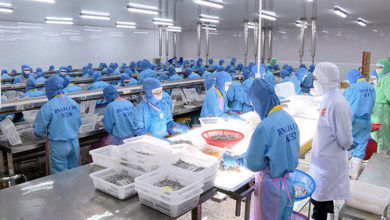Việt Nam fulfills international commitments as EVFTA takes effect
Việt Nam will continue to fulfill its international commitments so that it can take full advantage of the EU-Việt Nam Free Trade Agreement (EVFTA) and recover its economy amid a resurgence of COVID-19 pandemic.
Speaking at the forum on trade cooperation with EU partners on Friday, Hoàng Quốc Vượng, deputy minister of Industry and Trade, said the trade deal, which takes effect on August 1, will open up many co-operation opportunities between Việt Nam and the EU.
“Việt Nam, as one of a few countries to maintain positive growth this year, will continue to strengthen the business environment and complete the legal framework for trade and investment, ensuring the legal rights of investors, in order to take full advantage of this historic trade pact.”
The Government has directed the Ministry of Industry and Trade and Vietnamese Trade Offices in the EU and the UK to continue to provide Vietnamese enterprises with market information, connect them with foreign partners, and solve any problems they face penetrating the EU market, he said.
In the last 18 years, two-way trade value between the EU and Việt Nam has increased more than 13 times from about US$4.1 billion in 2000 to $56.45 billion last year. Vietnamese exports to the EU last year reached almost $41.5 billion and imports from the EU were over $14.9 billion, he said.
In the first five months of the year, 26 out of 27 EU countries invested in Việt Nam with 2,040 projects worth $21.66 billion, up $553 million compared to the same period last year, he added.
However, the COVID-19 pandemic has had a negative impact on activity in the first half of 2020, and the recovery is projected to be more gradual than previously forecasted.
The period saw Vietnamese exports to the EU market suffer a decline of 8.8 per cent to $16.1 billion due to the pandemic impact.
The markets that imported large volumes of Vietnamese goods during the period included Germany at $3.31 billion, down 0.2 per cent; the Netherlands at $3,178 billion, a fall of 1.8 per cent; Italy at $1,412 billion, a drop of 20.6 per cent; France at $1.5 billion, down 20 per cent; Spain at $963 million, a fall of 27.3 per cent; and Sweden at $556 million, a decline of 5.5 per cent.
Jean-Jacques Bouflet, vice chairman of European Commerce of Chamber in Việt Nam (EuroCham), said the trade deal would boost Việt Nam’s exports to the EU, one of the largest and most lucrative markets in the world.
With a population of more than 500 million and a combined GDP of over $15 trillion, accounting for 22 per cent of the world’s GDP, the EU is the largest exporter and importer in the world with annual trade of $3.8 trillion.
Việt Nam has made huge progress over the last few decades in streamlining business conditions and modernising the legal framework to catch new investment and business opportunities, Bouflet noted, adding that “the EVFTA is a strong vote of confidence in Việt Nam from the EU”.
He, however, said that the EU market is highly demanding so “exporters must meet its food safety and hygiene standards and management procedures, and provide transparent information related to labour and the working environment”.
In addition, other markets in the EU to which Vietnamese goods have yet to gain entry include Hungary, Poland, Bulgaria, Croatia, Luxembourg, Lithuania, Czech Republic, and Romania.
Slow global growth
In the latest report in June, the Asian Development Bank (ADB) forecasts that the global economy will suffer losses of $5.8 – 8.8 billion (equivalent to 6.4-9.7 per cent of the global GDP).
The latest update from ADB on June 18 said developing economies in Asia will grow very little this year since preventive measures against COVID-19 have affected their economic activity while import demand has weakened.
The International Monetary Fund (IMF) forecasts that the global economy is expected to grow at minus 4.9 per cent this year, the US at minus 8 per cent, the EU minus 10.2 per cent and China by only 1 per cent this year.
The World Bank (WB) forecasts that the global economy this year will shrink by 5.2 per cent. The economies of developed countries will shrink by 7 per cent as domestic demand and supply, trade, and finance have been severely disrupted, and emerging and developing markets will decrease by 2.5 per cent this year.
ADB forecasts that the economic growth of Việt Nam this year will be 4.1 per cent. This is 0.7 percentage points lower than its April estimate, but still the highest rate expected in Southeast Asia.
Experts recommend Việt Nam continue to improve its production capacity and ability to participate in international trade so that it can take full advantage of the EVFTA.
Vietnamese exporters should also pay more attention to rules of origin (RO), corporate social responsibility (CSR), sustainable development, and environmental protection, in addition to product quality and price.
Under the EVFTA, the EU will immediately remove import duties for 85.6 per cent of tariff lines – equivalent to 70.3 per cent of Việt Nam’s exports – when the agreement comes into effect.
After a seven-year period, 99.2 per cent of tariff lines – equivalent to 99.7 per cent of Việt Nam’s exports – will be eliminated.
On its side, Việt Nam will cut 48.5 per cent of tariff lines – equivalent to 64.5 per cent of EU exports – to zero per cent right after the agreement takes effect. After seven years, 91.8 per cent of EU tariff lines will be eliminated.
The forum, organised by the Ministry of Industry and EuroCham, connected participants online, allowing Vietnamese Trade Offices in the EU to directly interact and answer questions regarding market information and methods to use to approach and support local partners






